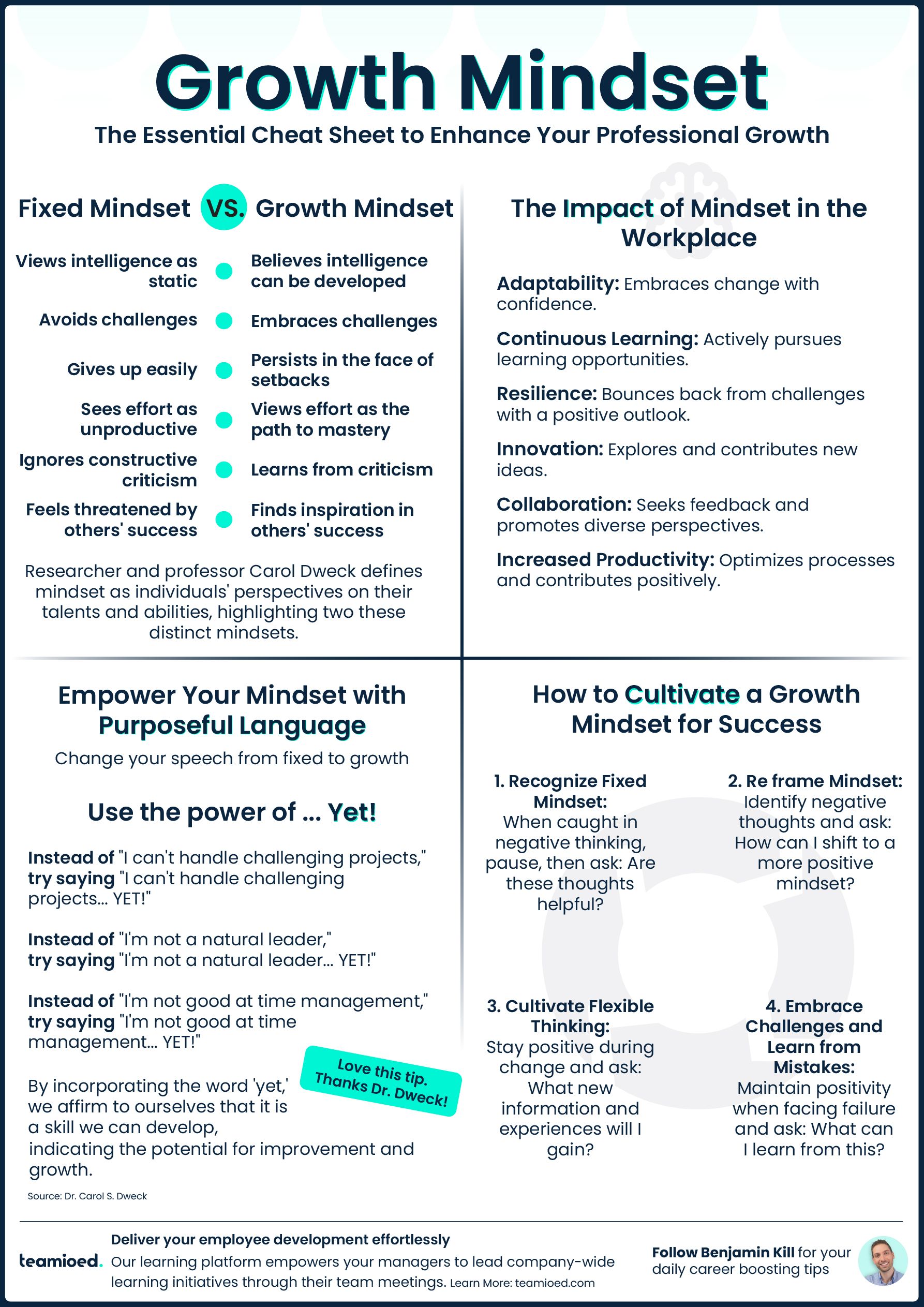Ben Kill, Chartered MCIPD
Growth Mindset - The Essential Cheat Sheet

In the realm of personal and professional development, the concept of a growth mindset versus a fixed mindset has emerged as a pivotal distinction, profoundly influencing how individuals approach challenges, learning, and failure. Coined by psychologist Carol Dweck through decades of research, these two mindsets encapsulate the underlying beliefs people have about learning and intelligence.
Understanding Fixed and Growth Mindsets
At its core, a fixed mindset is the belief that intelligence, talent, and abilities are innate traits that one cannot change. Individuals with a fixed mindset often perceive their capabilities as static, leading them to avoid challenges that might expose their inadequacies. This mindset breeds a fear of failure and a reluctance to push beyond comfort zones, as failure is seen as a direct reflection of their inherent worth.
In stark contrast, a growth mindset thrives on challenge and sees failure not as evidence of unintelligence but as a heartening springboard for growth and for stretching existing abilities. It is founded on the belief that intelligence and talents can be developed through dedication, hard work, and feedback. Those with a growth mindset view effort as the path to mastery and are resilient in the face of setbacks.
The Impact of Mindsets on Behavior and Performance
The divergence between these two mindsets has significant implications for behavior and performance. Fixed mindset individuals might plateau early and achieve less than their full potential because they opt out of challenging opportunities, fearing failure. On the other hand, those with a growth mindset reach higher levels of achievement, as they persist through difficulties, viewing them as opportunities to improve and learn.
Strategies for Cultivating a Growth Mindset
Transitioning from a fixed to a growth mindset is not merely an act of willpower but involves a series of conscious efforts and strategies. Here are actionable steps to cultivate a growth mindset:
Understanding Fixed and Growth Mindsets
At its core, a fixed mindset is the belief that intelligence, talent, and abilities are innate traits that one cannot change. Individuals with a fixed mindset often perceive their capabilities as static, leading them to avoid challenges that might expose their inadequacies. This mindset breeds a fear of failure and a reluctance to push beyond comfort zones, as failure is seen as a direct reflection of their inherent worth.
In stark contrast, a growth mindset thrives on challenge and sees failure not as evidence of unintelligence but as a heartening springboard for growth and for stretching existing abilities. It is founded on the belief that intelligence and talents can be developed through dedication, hard work, and feedback. Those with a growth mindset view effort as the path to mastery and are resilient in the face of setbacks.
The Impact of Mindsets on Behavior and Performance
The divergence between these two mindsets has significant implications for behavior and performance. Fixed mindset individuals might plateau early and achieve less than their full potential because they opt out of challenging opportunities, fearing failure. On the other hand, those with a growth mindset reach higher levels of achievement, as they persist through difficulties, viewing them as opportunities to improve and learn.
Strategies for Cultivating a Growth Mindset
Transitioning from a fixed to a growth mindset is not merely an act of willpower but involves a series of conscious efforts and strategies. Here are actionable steps to cultivate a growth mindset:
- Embrace Challenges: Seek out opportunities to stretch your abilities. Challenges are opportunities for growth, not threats to your intelligence or talent.
- Persist in the Face of Setbacks: Understand that setbacks are part of the learning process. Instead of giving up when faced with obstacles, use them as opportunities to learn and grow.
- See Effort as a Path to Mastery: Rather than viewing effort as a sign of weakness, recognize it as a necessary step towards mastering a skill or subject.
- Learn from Criticism: Instead of taking criticism personally, view it as valuable feedback that can guide your development and improvement.
- Find Lessons and Inspiration in the Success of Others: Instead of feeling threatened by others' success, use it as motivation to learn and grow. Success stories can provide valuable lessons about the strategies and efforts that lead to achievement.
Want to learn more? Teamioed specializes in technology-led team experiences that empower managers to run their own team development sessions. We’ve specifically designed these discussions to complement existing meetings and create minimal disruption whilst enhancing team cooperation, efficiency, and engagement. To learn more about Teamioed’s low-cost, subscription-based platform, click here.
Explore
Legal notice: Teamioed
Limited is a limited company registered in England with registered number
14441318. Our registered office is at Suite 2453 Unit 3a, 34-35 Hatton Garden,
London, United Kingdom, EC1N 8DX. For information about how we process data and
monitor communications please see our Privacy policy and for terms of use
please see our Terms and Conditions. Our
website has been prepared for general information only and you should always
obtain professional or specialist advice before taking any action on the basis
of the content of our website or our products or services. No rights are to be derived from any proposal contained on
our website and a licence cannot be deemed granted by us until a written
agreement containing all necessary terms and conditions is fully negotiated and
executed between the relevant parties.
All logos and trademarks are the property of their respective owners and are used for informational purposes only. We are not affiliated with, endorsed by, or sponsored by any of the companies represented by these logos.
All logos and trademarks are the property of their respective owners and are used for informational purposes only. We are not affiliated with, endorsed by, or sponsored by any of the companies represented by these logos.
© Teamioed 2026
Secured with SSL

Write your awesome label here.
Write your awesome label here.

